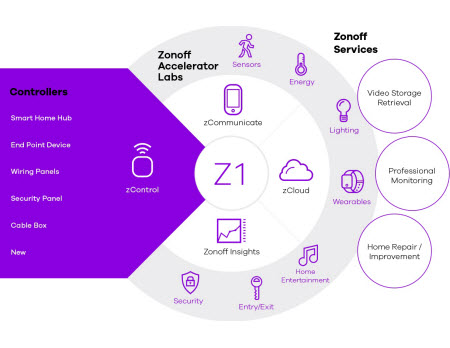White-Labeling the Internet of Things
The smarter way to stay on top of the multichannel video marketplace. Sign up below.
You are now subscribed
Your newsletter sign-up was successful

The Internet of Things (IoT) was one of the big things at the 2016 Consumer Electronics Show, but connecting lights, locks, thermostats and other “smart” devices will represent a significant challenge for cable operators as they look to flesh out their home security and automation services in the months and years ahead.
For one thing, there’s no uniformity on how these devices work together, as they tend to use a range of connection protocols, including WiFi, ZigBee, Bluetooth and Z-Wave.
Adding to the confusion is the emergence of smarthome frameworks, such as Apple Home Kit, The AllSeen Alliance, Google’s Weave, and a new “adaptive” smarthome plat form from Panasonic called ÔRA that is designed to work with the company’s own products, as well as third-party devices.
This challenge is not lost on cable operators, which view home automation and security as an important growth driver. In fact, several have already teamed up with Icontrol, including Comcast, Cox Communications, Rogers Communications, Time Warner Cable and Bright House. Suddenlink Communications (now part of Altice Group) has partnered with Alarm.com.
But that might not be enough. In fact, Comcast is already moving beyond Icontrol with a home-grown platform that supports the MSO’s own connected devices, as well as those from third parties that pass Comcast’s “Works with Xfinity Home” selection and certification program. Comcast is expected to explore licensing its new smart-home platform to other operators, as it’s now doing with its IP-capable X1 video platform. AT&T is also trying to license its platform, Digital Life, to telcos outside the United States. It’s clear that some big providers see IoT as a big opportunity.
Another company that is setting its sights on the IoT market, and with cable providers in particular, is Zonoff, a startup that has developed a white-label, protocol-agnostic platform called Z1.
Kevin Garton, Zonoff’s chief marketing officer, said one aim of the Malvern, Pa.-based company is to help partners get a grip on the interoperability challenge that has arisen as the market is flooded with an array of smart devices.
The smarter way to stay on top of the multichannel video marketplace. Sign up below.
At its heart, Zonoff is a software company, and Z1 is designed to provide partners with a platform that supports data and analytics, as well as a set of hardware services, including a certification program, for hubs and routers. Zonoff has also created a series of subscription services that can enable service providers to generate more revenue from their smarthome offerings, such as cloud video storage and a “home adviser” service that can dispatch workers to the customer if the system is alerted about an issue.
As a white-label offering, that means the provider gets to call the shots on how the service is branded and marketed.
Working with service providers is relatively new for Zonoff, which cut its teeth on do-it-yourself products and counts Icontrol, MiOS and Greenwave Systems among competitors in the turnkey group. On the retail front, for example, Zonoff’s technology underpins the Staples Connect home and home-office product line.
Garton said Zonoff has already secured several service provider deals, though it’s not at liberty to name them as most of its partners don’t want to confuse Z1 with their own branded service. That group includes a large French company in the “structured wiring industry,” as well as providers in the United States and Canada, he said.
Zonoff has also integrated with several smart home product makers, including Aeotec, Centralite, Danalock, Ecolink, D-Link, Kwikset, Jawbone, LG, Netgear, Lutron and Nest, among others.
Z1 centers on “true interoperability,” Garton said, noting that the system works with all radio-based technologies, including proprietary ones from partners such as Lutron, which specializes in connected home lighting.
Z1 is also keeping close tabs on developments surrounding WiFi HaLow, an emerging low-power, long-range version of WiFi tailored for IoT, as well as Bluetooth Smart, another new energy-efficient system.
